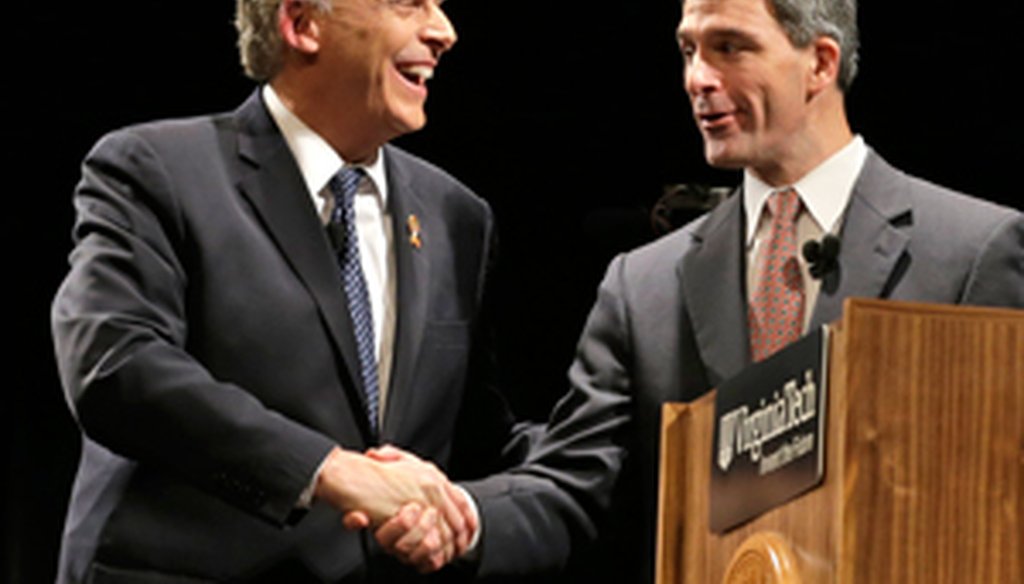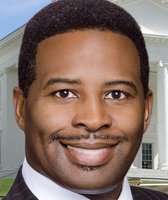Stand up for the facts!
Our only agenda is to publish the truth so you can be an informed participant in democracy.
We need your help.
I would like to contribute

Democrat Terry McAuliffe, left, and Republican Ken Cuccinelli shake hands before their final debate in the Nov. 5 gubernatorial election. Photo by AP.
Republican Ken Cuccinelli and Democrat Terry McAuliffe made several familiar claims during their final debate on Oct. 24. Here’s our quick review:
Cuccinelli: "Look at (McAuliffe’s) jobs promises from GreenTech. Up the road in Roanoke, he promised 5,000 jobs, and then in 2010, 2,000 union jobs in Virginia from GreenTech and then 900 jobs in Mississippi and then by the time he left as chairman it was down below 80 jobs in Mississippi and whatever is in China."
GreenTech Automotive is a struggling electric car company McAuliffe founded in 2009. He hoped to build a manufacturing plant in Virginia. On March 7, 2011, he told the Roanoke City Council that it would create about 5,000 jobs. A 2010 blog by the International Brotherhood of Boilermakers said McAuliffe said the plant would produce 2,000 union jobs in Virginia.
GreenTech did announce plans in late 2009 to build a factory in Mississippi and promised it would create about 1,500 jobs. The New York Times reported this August that the company only has about 80 employees working at a temporary plant.
Cuccinelli: "More people are just dying for the dignity of work, and I mean full-time work, not Obamacare part-time work."
Cuccinelli has been making similar claims during the campaign that the health care reform law is leading to lower-paying jobs. We recently examined a statement in which Cuccinelli said that since the Affordable Care Act was signed into law in March 2010, most of the new jobs in the U.S. have been part-time jobs.
The number of full-time workers has increased by 5 million since the law’s passage while the number of part-time employees has risen by 500,000. So contrary to Cuccinelli’s claim, the number of full-time workers has grown 10 times faster than part-time workers.
This year, it’s a different story, with part-time employment accounting for nearly two of three new positions. Some analysts said that part-time hiring trend this year is partly attributable to Obamacare, which requires businesses with over 50 employees to pay a penalty if they don’t provide insurance to people who work 30 hours or more each week. But economists often cite the sluggish economic recovery for the part-time trend.
Researchers at the Federal Reserve Bank in San Francisco said in a recent memo that the health care law’s impact on part-time work so far and in the future is "likely to be small."
McAuliffe: Cuccinelli "sponsored personhood legislation that would outlaw most forms of contraception would make the pill illegal."
Cuccinelli did sponsor a personhood bill in 2007, but it failed. Supporters say personhood laws, which aim to protect embryos from the moment of conception, provide a legal remedy to parents if an unborn child is killed by the negligence or criminal act of a third party. But opponents say the measures are a back-door means to challenging abortion and contraception.
The American Congress of Obstetricians and Gynecologists said personhood laws would threaten forms of contraception that could potentially prevent a fertilized egg from being implanted in a uterus. Those types include oral contraceptives, intrauterine devices and other hormonal contraceptives. Even if a legal challenge of those types of contraception began, though, the Supreme Court has previously ruled that access to contraception is a right for couples. So the result is an open legal question.
McAuliffe: Under Cuccinelli’s tax cut plan, "next year we could see thousands of teachers laid off."
McAuliffe has been making this claim based on a worst-case scenario from the Virginia Education Association, an organization that represents more than 60,000 teachers and has endorsed him. He assumes that Cuccinelli cannot find tax breaks and loopholes to fill to make up for the lost $1.4 billion in revenue that would result from Cuccinelli’s planned tax cut.
Cuccinelli, to the consternation of some, has not laid out which loopholes he would cut, instead opting to have them evaluated on effectiveness. The nonpartisan Joint Legislative Audit and Review Commission has said that there are $12 billion or so in tax breaks and loopholes given by the state each year. Cuccinelli has repeatedly said that if he can’t fill loopholes, he can’t have a tax cut. We recently ruled that a similar claim from McAuliffe was False.
Our Sources
The New York Times, "Hopeful’s Connections Jolt Bitter Virginia Race," Aug. 9, 2013.
Roanoke Free Press, "Terry McAuliffe would love to bring 5000 jobs to Roanoke VIDEO," July 31, 2013.
PolitiFact Virginia, "Cuccinelli says he never backed legislation that limits contraception choices," Sept. 16, 2013.
PolitiFact Virginia, "McAuliffe says Cuccinelli tax cuts could eliminate ‘over 8,000 teachers,’" Sept. 27, 2013.
PolitiFact Virginia, "Cuccinelli says most new jobs have been part time since Obamacare became law," Oct. 18, 2013.
The Federal Reserve Bank of San Francisco, "What’s behind the increase in part-time work," Aug. 26, 2013.























































